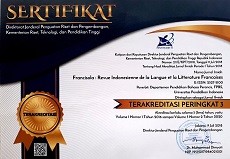Le « jeune » Flaubert et l’apprentissage des genres littéraires
Abstract
RÉSUMÉ. L’étude des premiers écrits de Flaubert est un domaine encore inexploré. Une telle étude est tellement salutaire pour saisir la formation de l’écrivain et décrire l’évolution de son style à travers les différentes étapes de son œuvre de jeunesse marquée par l’exploration de plusieurs genres littéraires. Pourquoi le jeune écrivain privilégie-t-il deux genres majeurs, le genre autobiographique qui lui permet de concrétiser sa faculté lyrique et le genre théâtral où se révèle sa nature oratoire ? Le style de Flaubert est animé par les deux dimensions lyrique et oratoire, lesquelles dimensions marquent le premier roman de maturité Madame Bovary. Si ce roman marque un tournant dans la carrière de l’auteur c’est d’une part parce qu’il cumule les procédés de l’œuvre de jeunesse et d’autre part constitue le dépouillement du style de cette même œuvre. C’est avec et contre les procédés de l’écriture romantique que Flaubert forgera son style.
Mots clés : Evolution, Flaubert, Genre, style, Roman.
ABSTRACT. The study of Flaubert's early writings is a domain that has not been explored yet. Conducting such a study is so beneficial for grasping the writer's formation and describing the evolution of his style through the different stages of his youthful work, which is marked by the exploration of several literary genres. Why does the young writer privilege two major genres, the autobiographical genre that allows him to concretize his lyric faculty and the theatrical genre in which his oratorical nature is revealed? Flaubert's style is animated by the two lyrical and oratorical dimensions, which characterize maturity of his first novel Madame Bovary. If this novel marks a turning point in the author’s career, it is because, on the one hand, it combines the processes of the work of youth, and, on the other hand, it consitutes the emerging style of the same work. It is with and against the processes of romantic writing that Flaubert forges his style.
Keywords : Evolution, Flaubert, genre, novel, style.
Full Text:
PDFReferences
Bruneau, J. (1962). Les débuts littéraires de Flaubert. Paris : Armont Colin.
Bruneau, J. (dir.) (1973). Correspondance I Gustave Flaubert (1830-1851). Paris : Gallimard, coll. « Bibliothèque de Pléiade»
de Biasi, P. M. (1988). Flaubert: dynamique de la genèse. Ann. Scuola Norm. Sup. Pisa, 87-102. Repéré à http://www.item.ens.fr/articles-en-ligne/flaubert-dynamique-de-la-genese/.
de Biasi, P.M. (2000). La génétique des textes. Paris : Ed. Nathan.
Faguet, E. (1899). Flaubert. Paris : Librairie Hachette.
Genette, G. (1966). Figures II. Paris : édition du Seuil.
Gothot-Mersch, C., et Sagnes, G. (dir.) (2001). Oeuvres complètes I. Oeuvres de jeunesse. Paris : Gallimard, coll. « Bibliothèque de Pléiade »
Thibaudet, A. (1935). Gustave Flaubert. Paris: Gallimard.
DOI: https://doi.org/10.17509/francisola.v3i1.11889
Refbacks
- There are currently no refbacks.
Copyright (c) 2018 FRANCISOLA

This work is licensed under a Creative Commons Attribution-ShareAlike 4.0 International License.
View My Stats











